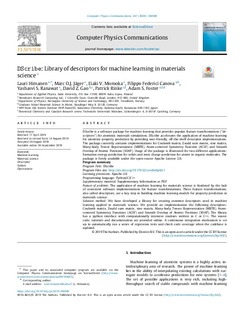| dc.contributor.author | Himanen, Lauri | |
| dc.contributor.author | Jager, Marc OJ | |
| dc.contributor.author | Morooka, Eiaki V | |
| dc.contributor.author | Federici Canova, Filippo | |
| dc.contributor.author | Ranawat, Yashasvi S | |
| dc.contributor.author | Gao, David Zhe | |
| dc.contributor.author | Rinke, Patrick | |
| dc.contributor.author | Foster, Adam S | |
| dc.date.accessioned | 2020-03-04T07:41:58Z | |
| dc.date.available | 2020-03-04T07:41:58Z | |
| dc.date.created | 2019-10-22T09:29:27Z | |
| dc.date.issued | 2019 | |
| dc.identifier.citation | Computer Physics Communications. 2020, 247 . | nb_NO |
| dc.identifier.issn | 0010-4655 | |
| dc.identifier.uri | http://hdl.handle.net/11250/2645057 | |
| dc.description.abstract | DScribe is a software package for machine learning that provides popular feature transformations (“descriptors”) for atomistic materials simulations. DScribe accelerates the application of machine learning for atomistic property prediction by providing user-friendly, off-the-shelf descriptor implementations. The package currently contains implementations for Coulomb matrix, Ewald sum matrix, sine matrix, Many-body Tensor Representation (MBTR), Atom-centered Symmetry Function (ACSF) and Smooth Overlap of Atomic Positions (SOAP). Usage of the package is illustrated for two different applications: formation energy prediction for solids and ionic charge prediction for atoms in organic molecules. The package is freely available under the open-source Apache License 2.0.
Program summary
Program Title: DScribe
Program Files doi: http://dx.doi.org/10.17632/vzrs8n8pk6.1
Licensing provisions: Apache-2.0
Programming language: Python/C/C++
Supplementary material: Supplementary Information as PDF
Nature of problem: The application of machine learning for materials science is hindered by the lack of consistent software implementations for feature transformations. These feature transformations, also called descriptors, are a key step in building machine learning models for property prediction in materials science.
Solution method: We have developed a library for creating common descriptors used in machine learning applied to materials science. We provide an implementation the following descriptors: Coulomb matrix, Ewald sum matrix, sine matrix, Many-body Tensor Representation (MBTR), Atom-centered Symmetry Functions (ACSF) and Smooth Overlap of Atomic Positions (SOAP). The library has a python interface with computationally intensive routines written in C or C++. The source code, tutorials and documentation are provided online. A continuous integration mechanism is set up to automatically run a series of regression tests and check code coverage when the codebase is updated. | nb_NO |
| dc.language.iso | eng | nb_NO |
| dc.publisher | Elsevier | nb_NO |
| dc.rights | Navngivelse 4.0 Internasjonal | * |
| dc.rights.uri | http://creativecommons.org/licenses/by/4.0/deed.no | * |
| dc.title | DScribe: Library of descriptors for machine learning in materials science | nb_NO |
| dc.type | Journal article | nb_NO |
| dc.type | Peer reviewed | nb_NO |
| dc.description.version | publishedVersion | nb_NO |
| dc.source.pagenumber | 12 | nb_NO |
| dc.source.volume | 247 | nb_NO |
| dc.source.journal | Computer Physics Communications | nb_NO |
| dc.identifier.doi | 10.1016/j.cpc.2019.106949 | |
| dc.identifier.cristin | 1739392 | |
| dc.description.localcode | This is an open access article distributed under the terms of the Creative Commons CC-BY license, which permits unrestricted use, distribution, and reproduction in any medium, provided the original work is properly cited. | nb_NO |
| cristin.unitcode | 194,66,20,0 | |
| cristin.unitname | Institutt for fysikk | |
| cristin.ispublished | true | |
| cristin.fulltext | original | |
| cristin.qualitycode | 1 | |

